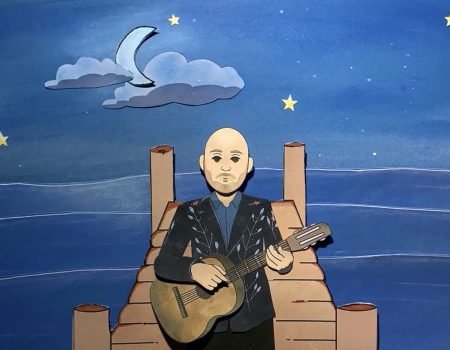Dear Elizabeth
I spent a lot of time on my fire escape back then; Hell’s Kitchen just made better sense from just a few flights up.
My first apartment, there on 56th and Tenth Avenue, was across the street from a New York City public high school. We looked right in on the classrooms.
In those early days at MTV News, I woke before dawn, strode into1515 Broadway by five o’clock, published my first news story by six, and was home by three. I spent months of afternoons alone on that fire escape, strumming my Takamine, watching the students mill about below.
Sometime in the fall of 1998, I spotted a janitor slowly pushing his broom across a classroom. He bent down to pick something up: a note – the kind teenagers scribble on notebook paper, fold and pass amongst themselves to punctuate algebra doldrums.
Then the janitor, tall, lanky, and pale, unfolded it, stood motionless, and began reading.
Dark falls to early these days
As I begin my shift
All silence and cold fluorescent light
Still you get used to it
Adrift in a fog of memories, our protagonist is paralyzed by a wave of loss and regret.
The school is empty, the rush and whir of students through hallways frozen as our protagonist reads on, evoking archetypes of love and loss.
Halls lost their laughter this afternoon
When they ran off to the play
I know that they’ll be back here together soon
Joan of Arc and JFK
And then, the refrain: a wish, a concession, and a prayer.
Dear Elizabeth, deliver me, deliver my soul
I gave it away
Dear Elizabeth, remember me, remember me whole
I still have somrthing to say
He folds the note, tucks it into his pocket, and begins pushing his broom.
Edges are torn now
Ink fades to gray
I resume my shift
And finally, the line that has travelled with me through time, making cameos in other songs, and on other albums:
What’s left behind
To should grows weightless;
Like the early darkness of winter or soul crushing monotony of a day job, we assume the weight of our burdens; the lode we carry becomes us.
You get used to it.
I called the song, “Nightwatch,” and recorded a solo acoustic version live to tape in November, 1999. It was released it on a limited-run EP called, “Legend of the Evening Star,” in December.
The next summer, as I began recording the album that would become, “Crash Site,” we re-recorded it. The full band version was sluggish and loping, though, a distant, lesser sibling to the crackling, original. And so we added drums and bass, electric guitar backing vocals to the original live track.
I was on my way to drop 350 full-color postcards with the album cover on front – a jet plane shuddering and trembling as it approached a crash landing – into the Radio City Station mailbox when I saw smoke billowing from the Twin Towers. Letters never sent.
By the time “Crash Site” was released in December, I had conceded the inevitable, re-naming “Nightwatch” what it demanded all along. “Dear Elizabeth” was already a set staple.
Twenty years later, as I assess my best and favorite work for my new collection of “greatest hits,” “Elizabeth” is probably my greatest. I know this from watching audiences sway and sing. I know this from riding the minor fall and major lift like surf, from wringing every second of breath from my belly until the final note floats down across the instruments.
“…to say.”
Darkness returns.
And I resume my shift.
“Dear Elizabeth,” from my forthcoming collection, “Essential Benjamin Wagner 2001-2021,” is available now on Spotify, Apple and everywhere you download and stream music. Friends & Neighbors is a Wagner Bros production. Download the podcast on Apple, stream it on Spotify, watch it on Facebook or YouTube, and subscribe to our newsletter on Friends & Neighbors Show Dot Com.



